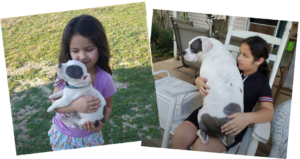By Dr. Alicia Simoneau, Humane Pennsylvania Chief Veterinary Officer
April is National Heartworm Awareness Month! To make sure all dogs are protected from this serious disease, Dr. Simoneau has provided some valuable information for you and your pets.
A pervasive, serious medical condition, heartworm disease affects more than 1 million dogs in the U.S. every year. The disease can cause irreparable organ damage, but it can be both treated and prevented. Cats and ferrets may also be affected by heartworms, but usually not to the same extent as dogs.
What Causes Heartworms?
Heartworm disease is caused by an internal blood parasite, Dirofilaria immitis. Adult heartworms produce a pre-larval stage of the parasite, called microfilaria, which is passed from one dog to another by mosquitos.
How Does Heartworm Disease Spread and Develop?
In geographic areas where mosquitos thrive year-round, heartworm disease remains endemic. Heartworms are diagnosed nationwide, but the Southeastern states harbor mosquitos that carry heartworm. Dogs are frequently taken from the south to the northeast, and people take their pets on vacation.
 When a mosquito has a blood meal from a dog that has adult heartworms, the microfilaria is taken in by the mosquito and undergoes transformation to a larval stage, which can now be a source of infection for another dog. This larval stage parasite is injected from the mosquito to another dog with the next blood meal the mosquito takes.
When a mosquito has a blood meal from a dog that has adult heartworms, the microfilaria is taken in by the mosquito and undergoes transformation to a larval stage, which can now be a source of infection for another dog. This larval stage parasite is injected from the mosquito to another dog with the next blood meal the mosquito takes.
Inside the canine host, the larval stage parasite matures into the adult stage. If not prevented by medication, the worms continue developing. As the parasite molts in the dog, it migrates through its tissue and travels into the bloodstream. The parasite finds the heart and blood vessels to the lungs, where it stays permanently lodged and is now a mature adult. The process from the larval stage to the adult stage takes about 7 months, and adult heartworms can live for 5 to 7 years.
Untreated heartworm disease results in congestive heart failure in the dog. However, the heartworm infection causes scar tissue and severe inflammation to develop even before the end-stage disease. These effects can occur as early as 7 to 12 months after a dog is bitten by an infective mosquito.
How Can Heartworms Be Prevented?
The larval stages are susceptible to medication known as heartworm preventative, which kills them and prevents them from developing into adult worms. Heartworm preventatives work to kill the heartworm larva in the dog’s tissues the day they are given. The aim is to prevent the current infection from advancing, i.e., prevent the parasite larva from developing into adults.
Heartworm preventatives do not have lasting effects, however. They clear larval heartworm infections once every 30 days. As such, they must be administered to the dog every 30 days.
It is recommended to work with a vet to get a dog on a testing schedule and give medication that kills the larval stage of the heartworm before it has the chance to mature into an adult worm and cause excessive damage.
larval stage of the heartworm before it has the chance to mature into an adult worm and cause excessive damage.
Screening tests look for antigens that are produced by adult female heartworms. The heartworm doesn’t make the antigen the test is looking for until the heartworm is mature, and maturity occurs 7 months after an infective mosquito transmits the larval stage of heartworm via a blood meal. This is why puppies don’t need a heartworm test to start the medication that kills the larval stage.
There is no way of knowing if immature worms exist, so testing is recommended 4 to 7 months after exposure. In young dogs at higher risk, testing twice in the first year is recommended. For adult dogs that are given year-round heartworm preventative monthly, or for other lower-risk patients that are given the preventative yearly, testing is often the recommendation.
How Is Heartworm Disease in Dogs Treated?
Once a dog is diagnosed with adult heartworms, the treatment is a year-long process. A series of oral and injectable medications are administered under the observation and guidance of a veterinarian, and stringent exercise restriction is necessary for many months.
Once the active infection is cleared, the dead adult heartworms continue to break down and be removed by the dog’s body. Scar tissue will always remain in the dog’s lung vessels and heart.
The Bottom Line
This internal blood parasite has life-threatening consequences for dogs — and those who consider them to be a family member — and it is prevalent in the United States. Heartworm disease in dogs is much easier to prevent than treat, so it is imperative to work with a veterinarian to develop a heartworm prevention plan specific to your dog to keep them healthy and happy.
Schedule an appointment and develop a heartworm prevention plan by visiting https://hvhospitals.org/contact-us/!
 Peaches, a five-year-old spayed female pug, was surrendered to the Freedom Center for Animal Life-Saving last week after a construction worker found her onsite, wrapped in a blanket outside with small bowls of food and water. The worker brought Peaches to the Freedom Center in Berks County, where she was immediately taken in and cared for – the shelter staff made sure to check for a microchip right away as part of the surrender protocol.
Peaches, a five-year-old spayed female pug, was surrendered to the Freedom Center for Animal Life-Saving last week after a construction worker found her onsite, wrapped in a blanket outside with small bowls of food and water. The worker brought Peaches to the Freedom Center in Berks County, where she was immediately taken in and cared for – the shelter staff made sure to check for a microchip right away as part of the surrender protocol. challenges with her current living arrangements, she made peace knowing that Peaches was doing well and was in safe hands at the Freedom Center. Although Peaches and her owner didn’t head back home together, the closure made possible because of that microchip is why it’s so important. Think of that scene in Cast Away when the wife realizes the husband she thought she lost forever had survived the plane crash and was, in fact, alive. While life’s circumstances couldn’t allow them to be together, both found peace in knowing that the love they shared was real and they no longer had to wonder.
challenges with her current living arrangements, she made peace knowing that Peaches was doing well and was in safe hands at the Freedom Center. Although Peaches and her owner didn’t head back home together, the closure made possible because of that microchip is why it’s so important. Think of that scene in Cast Away when the wife realizes the husband she thought she lost forever had survived the plane crash and was, in fact, alive. While life’s circumstances couldn’t allow them to be together, both found peace in knowing that the love they shared was real and they no longer had to wonder.

 Is adopting a shelter pet the way to go? Does adopting an animal really make that much of a difference? For some, the answer is simple and automatic. For others, it’s not.
Is adopting a shelter pet the way to go? Does adopting an animal really make that much of a difference? For some, the answer is simple and automatic. For others, it’s not. no longer has to spend their time in a small cage or kennel — but there’s an emotional aspect for you as the adopter, too. You will always be the one who changed that animal’s life and gave them their forever home. It creates a bond that you will always feel.
no longer has to spend their time in a small cage or kennel — but there’s an emotional aspect for you as the adopter, too. You will always be the one who changed that animal’s life and gave them their forever home. It creates a bond that you will always feel. Athena found me in January 2016, when I was searching for the perfect pup to call my own. I had grown up with lots of animals and, as I was living alone across the country, I felt it would be the perfect time to find a companion to share my life with. A family friend mentioned they had a puppy that they loved but could no longer care for. I immediately went to meet Athena, and I fell in love with her instantly.
Athena found me in January 2016, when I was searching for the perfect pup to call my own. I had grown up with lots of animals and, as I was living alone across the country, I felt it would be the perfect time to find a companion to share my life with. A family friend mentioned they had a puppy that they loved but could no longer care for. I immediately went to meet Athena, and I fell in love with her instantly.




 When a mosquito has a blood meal from a dog that has adult heartworms, the microfilaria is taken in by the mosquito and undergoes transformation to a larval stage, which can now be a source of infection for another dog. This larval stage parasite is injected from the mosquito to another dog with the next blood meal the mosquito takes.
When a mosquito has a blood meal from a dog that has adult heartworms, the microfilaria is taken in by the mosquito and undergoes transformation to a larval stage, which can now be a source of infection for another dog. This larval stage parasite is injected from the mosquito to another dog with the next blood meal the mosquito takes. larval stage of the heartworm before it has the chance to mature into an adult worm and cause excessive damage.
larval stage of the heartworm before it has the chance to mature into an adult worm and cause excessive damage.